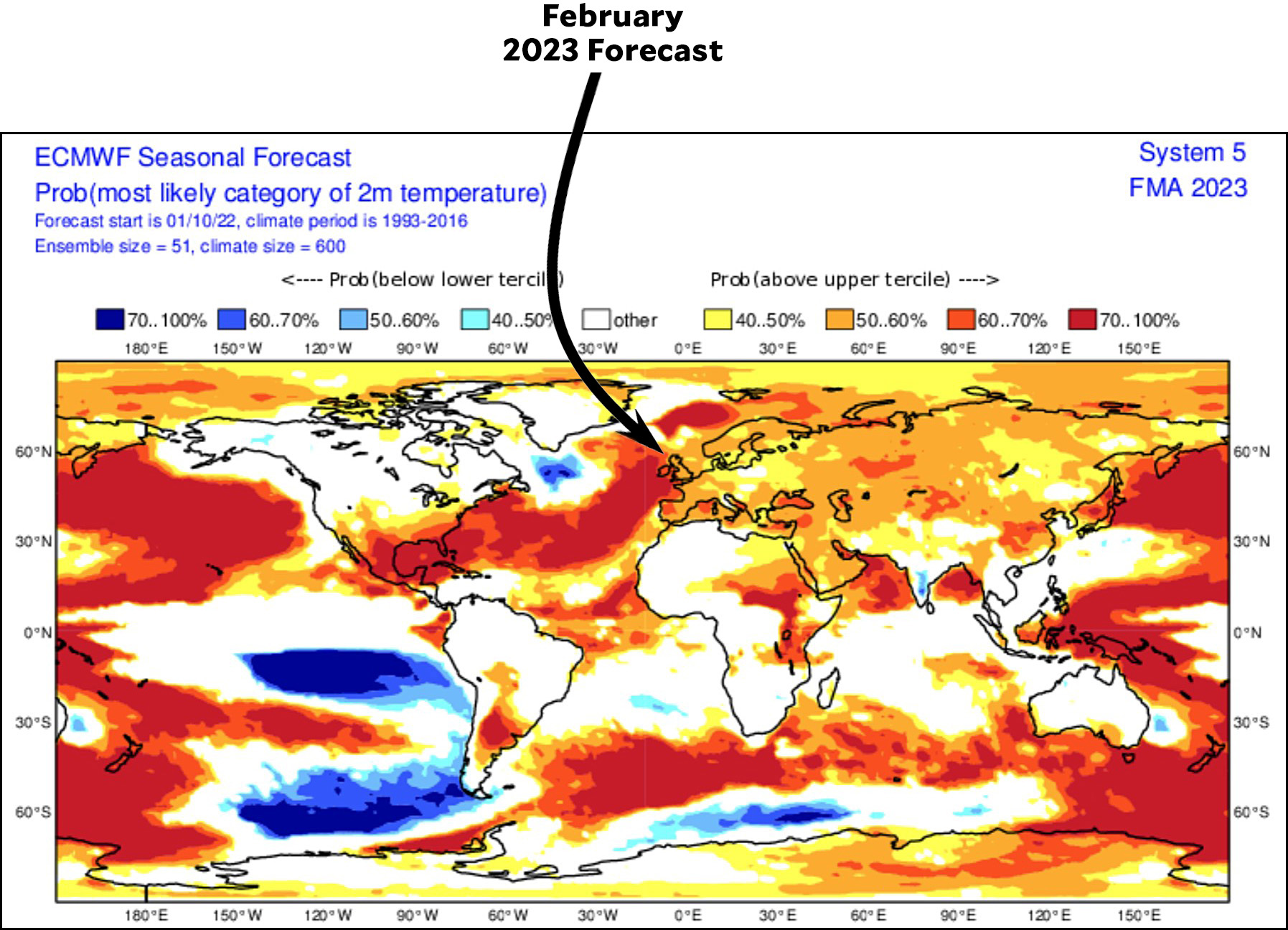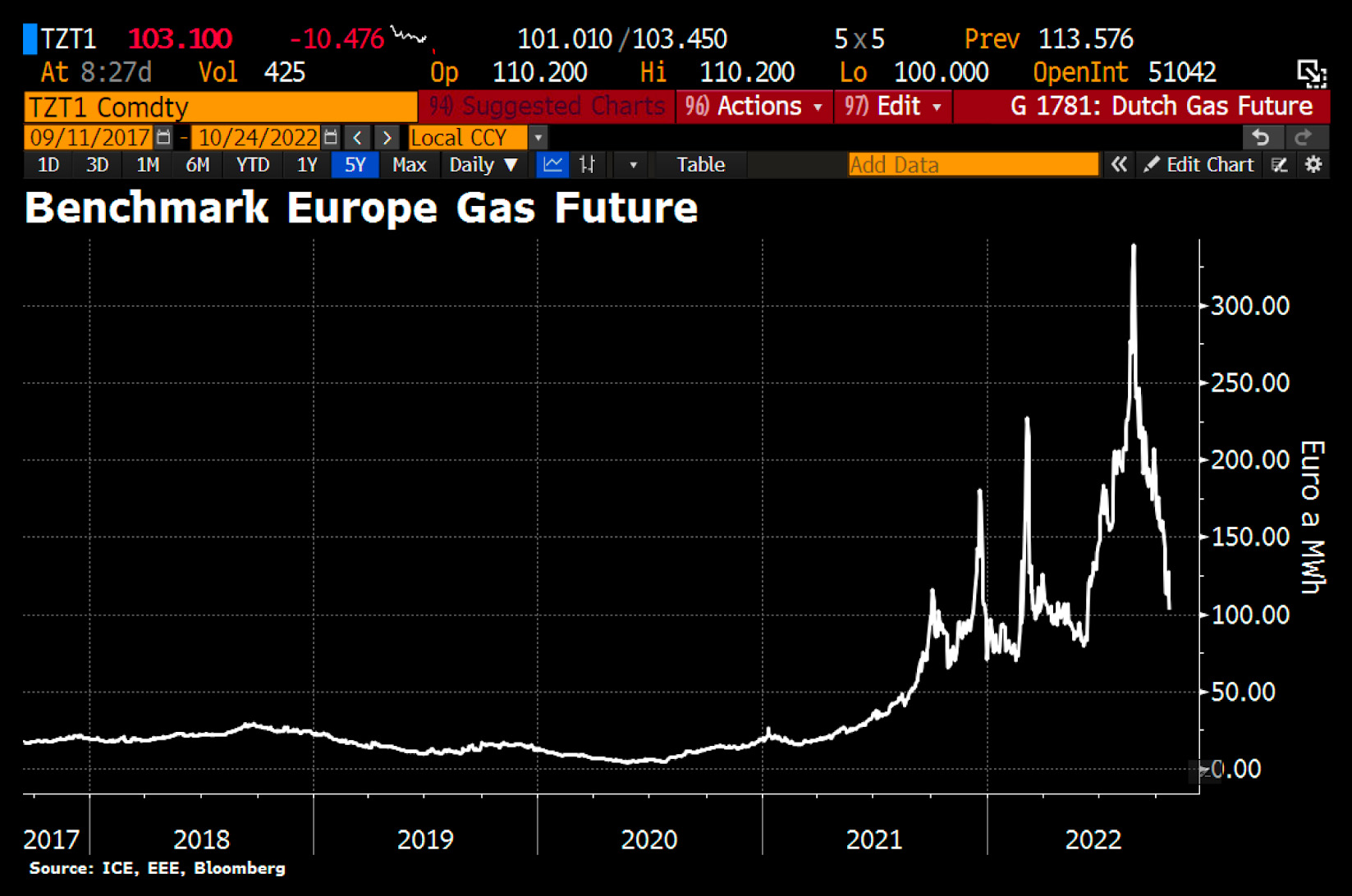The European Centre for Medium-Range Weather Forecasts has decided that Europe is likely to have a mild winter this year thanks to its third consecutive year of La Niña influence:
 Partly because of this, and partly because Europe has been successful in refilling its natural gas reserves, the price of gas has plummeted over the past month:
Partly because of this, and partly because Europe has been successful in refilling its natural gas reserves, the price of gas has plummeted over the past month:
 Cross your fingers. But it looks like the Ukraine War will have a muted effect on European gas supplies and prices.
Cross your fingers. But it looks like the Ukraine War will have a muted effect on European gas supplies and prices.

Yes, potentially good news for this winter for Europe. The broader questions:
- Do you think in year two (three, four or five) Europe is about to return to Russian gas?
- Do you think, in the same timeline, Europe will not need huge amounts of gas?
- Is the US, or someone else, going to create the capacity to export sufficient LNG to Europe to replace Russian gas?
I don't think Russia will ever return to being Europe's primary energy supplier after this war. They really shit the bed and there's no going back now, at least as long as Putin, or Putinism, holds sway there. Norway, the Middle East (particularly North Africa) and, to a lesser extent, the US have emerged as the major gas suppliers to the EU from now on and are well on the way to replacing the Russian supply chains.
"are well on the way to replacing the Russian supply chains." No they re not. And they never will be. That's an impossibility. Why the price for delivery of natural gas in dec is 35% more than for delivery today and 240% more in the UK.
Sorry, the UK price has different units.
They would be idiots to turn to LNG. IF they can't get the natural gas from Russia, they should just go back to coal. There is little to no climate benefit to LNG over coal. The number of times I've seen liars or the grossly incompetent allegedly compare LNG CO2 to coal while using piped numbers (about half the LNG number) is astounding.
That holds for generating electricity--but not for gas piped into people's houses. Also, certain industries rely on natural gas--electricity might not be a straight forward option in some of those cases.
should note: gas works for peaker plants--coal, not so much.
You can use oil for peaker plants. And you can do peaking with coal at the price of higher maintenance costs. And peaking is less of a problem with high penetration of renewables. Wind is at max at sunset, solar is high at other high usage times.
The last time I saw a coal-fired home furnace was 1961. Just sayin' ...
Yes, I was referencing electricity generation. And if you stop generating electricity from natural gas, there will be more gas for residential use.
According to this I'm going to have an 'other' winter.
Not in the least in the least surprised, it's the same winter we always have.
Like it came out of Coraline, the Other Mother's winter.
Thanks for the "Coraline" reference! I was trying to recall the name of that story last week and came up empty.
With prices still more than four times higher than before the start of the Russo-Ukraine War, that is an interesting definition of “muted” …
A significant reason for the price drop has been the shutdown of manufacturing, Germany specifically, which is driving Germany into recession.
The price differential between Henry Hub and European import spot price is over $50/mmbtu.
Expect US prices to shift upward as Germany finishes LNG storage and delivery and sellers seek higher prices in Europe, don't you think?
The price difference should be larger since 50% won't come close to the cost of liquidification.
Oops, again I was working in european units. %50/mmbtu is the cost to ship natural gas to europe.
Thats the price for natural gas delivered Nov. 1st. For natural gas delivered Dec 1st, the price is already 35% higher. In England, natural gas for delivery Dec 1 is 340$ or 240% hihger. Drum's optimistic outlook is very premature. Europe needs both full storage and a reliable delivery to survive the winter. They'll have the storage but don't seem to have the 50% of their winter gas that is delivered during the winter.
Oops, that includes room and board.
You can generalize stuff like El Nino and La Nina but longer range forecasts are little better than a coin flip. In North America La Nina can mean a dry winter on the East Coast but flip flops between warmer and cooler than normal temps.
Note: the forecast is relative to the 1993-2016 average--so historically warm already.
Not sure exactly what the reported odds mean or what the "normal" range, i.e. within 2 oC of the average? Presumably the 50% chance of being above average is not also a 50% chance of being below average, but mainly 50% chance of being within the average window.
Does this mean that the Russians will be booted out of Ukraine sometime in the next 365 days?
Tories choosing a new leader,
https://mobile.twitter.com/burt_cdburt/status/1582987013845721090
The guy who lost thought it would be a good idea to be leader but then realized it would be too much of a headache.
The smart one! They should all vote for him anyway.
I've picked up the gauntlet and I'm finally reading Neil Gaiman.
The one thing I know about British politics is that Neil Gaiman is going to be the first comic book creator to be knighted.
Absolute certainty.
Then read Chivalry as illustrated by Colleen Doran. A fun little story beautifully illustrated.
OK!
It really is about the next winter, or the next few ones. We Europeans (I live in France) need that time to adapt. But it's possible and high gas prices may actually help, by making individuals think more about energy economy instead of leaving it up to politicians all the time. Homes, for example, used to be heated only in part - only the kitchen or living room, and that's how I still do it. Now it's the whole house, but with better isolation. Imagine the majority of the population combining the two techniques, which is possible since most people grew up in not entirely heated homes and are familiar with that. Even with the present higher prices I pay only about 50 euros a month for energy in the home.
Add renewables and the future without Russian energy doesn't look bad. The bigger worries are the weaponization of food, domestic threats to democracy and of course climate change.
I should add that we have great and affordable public transportation, and the past public cost thereof may prove to have been a good investment.
Plus that our cities are compact, built as they were before the automobile.
Do the Europeans even want a mild winter? They have had an exceptionally dry summer. What they need now is lots and lots of snow that can feed the big rivers for next summer. To hell with the mild winter!